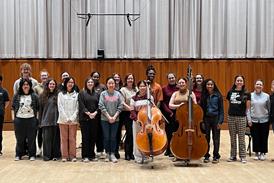- News
- For Subscribers
- Student Hub
- Playing Hub
- Directory
- Lutherie
- Magazine
- Magazine archive
- Whether you're a player, maker, teacher or enthusiast, you'll find ideas and inspiration from leading artists, teachers and luthiers in our archive which features every issue published since January 2010 - available exclusively to subscribers. View the archive.
- Jobs
- Shop
- Podcast
- Contact us
- Subscribe
- School Subscription
- Competitions
- Reviews
- Debate
- Artists
- Accessories
Masterclass: Richard O’Neill on Brahms’ String Quartet no.3 op.67

The Takács Quartet violist looks at the first and third movements of this well-loved B flat major work, where his instrument is thrown into a rare spotlight
Explore more Masterclasses like this in The Strad Playing Hub
Read more premium content for subscribers here
Brahms was such a passionate person and his music is gorgeous, but there’s a sense of lonely desolation in some of his string quartet writing that breaks my heart. For me, his three quartets give a glimpse into his character in a way that none of his other compositions do, and op.67 in particular shows what a master he was. While he was progressive as a composer, he was always looking back to earlier music, including the traditions of Bach and Beethoven. I don’t think that he ever tried to sound ‘new’ – he just took old music and honoured it. His quartets are very Beethovenian in that sense, with an allegro first movement, followed by a slow movement and scherzo or minuet and trio, and then a rondo or other type of finale. At the same time, they are very Brahms!
Already subscribed? Please sign in
Subscribe to continue reading…
We’re delighted that you are enjoying our website. For a limited period, you can try an online subscription to The Strad completely free of charge.
* Issues and supplements are available as both print and digital editions. Online subscribers will only receive access to the digital versions.




























